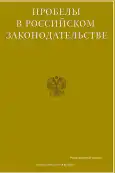Topical Issues of the Fight Against Extremism and Terrorism in the Russian Federation in the Conditions of Aggression of Geopolitical Conflicts in the Post-Soviet Space
- Authors: Shkhagapsoyev Z.L.1, Tarchokov B.A.1
-
Affiliations:
- Krasnodar University of the Ministry of Internal Affairs of Russia
- Issue: Vol 16, No 5 (2023)
- Pages: 478-482
- Section: Miscellaneous
- URL: https://journal-vniispk.ru/2072-3164/article/view/250180
- EDN: https://elibrary.ru/XPLSYF
- ID: 250180
Cite item
Abstract
The development of modern international relations influences the improvement of illegal practices. Of particular importance in this context is the spread of extremist and terrorist manifestations.
For the Russian state, it is currently relevant to consider the process of development of extremism and terrorism in the context of the aggravation of the geopolitical conflict with Ukraine and the conduct of a special military operation in the Donbass. These processes are a natural result of long tense interstate relations. Given the fact that in recent years the number of extremist crimes has significantly increased and quite a lot of terrorist acts have been prevented, questions arise about the effectiveness of modern mechanisms for combating extremism and terrorism in the Russian Federation. The purpose of the present study is to analyze the current issues of combating extremism and terrorism in the Russian Federation, taking into account modern international and domestic political realities. The authors come to the conclusion that despite the close attention to the issues of anti-extremist and counter-terrorism activities in the Russian Federation, the above-mentioned functioning of the competent state authorities and civil society institutions does not always take into account current trends in the development of relevant illegal ideas and views in modern geopolitical realities, and also the possibility of the impact of anti-Russian propaganda, which is currently carried out by many foreign countries, including as part of external sanctions pressure. Attention is focused on individual factors contributing to the development of extremist and terrorist behavior on the territory of the Russian state. The need to improve preventive and preventive activities of anti-extremist and counter-terrorism orientation in terms of organizing its outstripping influence on the consciousness of the population in the context of international and domestic processes currently taking place is noted.
Full Text
##article.viewOnOriginalSite##About the authors
Zaurbi L. Shkhagapsoyev
Krasnodar University of the Ministry of Internal Affairs of Russia
Email: btarchokov@mail.ru
SPIN-code: 7958-2960
Scopus Author ID: 506942
Dr.Sci.(Law), Professor, Head of Institute, North Caucasus Institute for Advanced Studies (branch)
Russian Federation, Nalchik, KBRBeslan A. Tarchokov
Krasnodar University of the Ministry of Internal Affairs of Russia
Author for correspondence.
Email: btarchokov@mail.ru
Scopus Author ID: 680384
Police Colonel, Cand.Sci.(Econ.), Head of the Department of Internal Affairs in Special Conditions, North Caucasus Institute for Advanced Studies (branch)
Russian Federation, Nalchik, KBRReferences
- Gavrilov D.A., Gavrilova V.D. To the question of the transformation of legal policy in the field of countering extremism and Nazism // Law and Practice. 2022. No. 2. P. 153-157.
- Risk groups in the field of countering the ideology of terrorism and extremism // Obzor.NTSPTI. 2022. No. 4 (31). pp. 44-47.
- Registered extremist crimes // Prosecutor General's Office of the Russian Federation. Legal Statistics Portal. URL: http://crimestat.ru/offenses_chart (date of access: 06/10/2023).
- Mustafaeva M.G., Mustafaev F.M., Ibragimov M.A. Terrorism and extremism: socio-legal analysis // Humanitarian and socio-economic sciences. 2022. No. 1 (122). pp. 11-16.
- Review of the judicial practice of the Supreme Court of the Russian Federation No. 1 (2023) (approved by the Presidium of the Supreme Court of the Russian Federation on April 26, 2023). The document has not been published. Access from ATP "ConsultantPlus".
- Obrinskaya E.K. The potential of mental security in countering extremism and terrorism // Uchenye zapiski Crimean Federal University named after V.I. Vernadsky. Philosophy. Political science. Culturology. 2023. V. 9 No. 1. P. 106-116.
- Opalev A.V. Modern information technologies as a tool for the activities of extremist and terrorist organizations // Bulletin of the Moscow University of the Ministry of Internal Affairs of Russia. 2022. No. 5. P. 187-190.
- Tarasov V.Yu. Prevention of the spread of ideas of extremism and terrorism on the Internet // Victimology. 2023. V. 10. No. 1. P. 101-106.
Supplementary files








